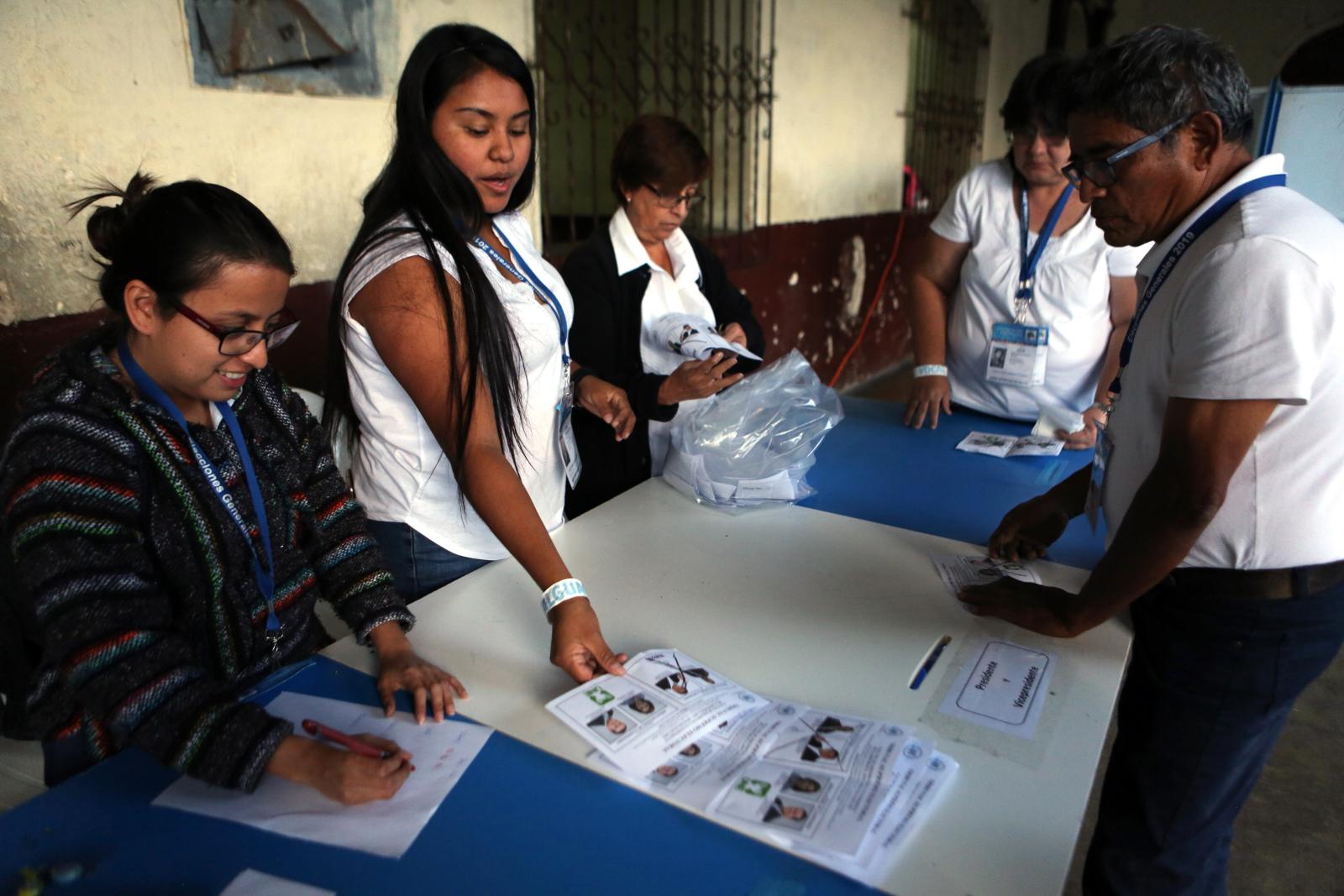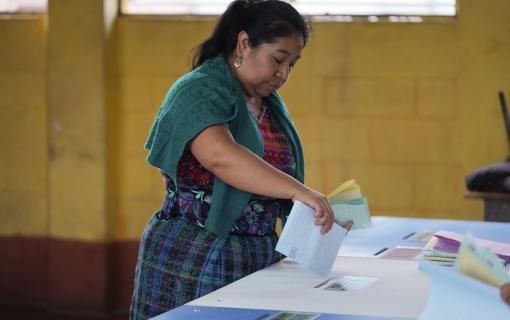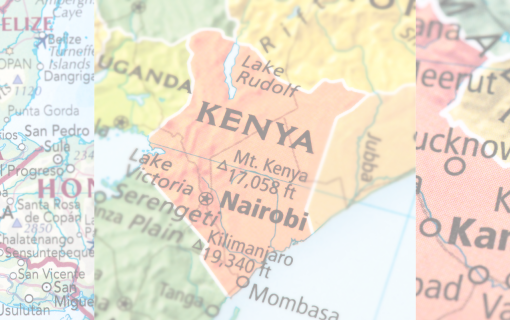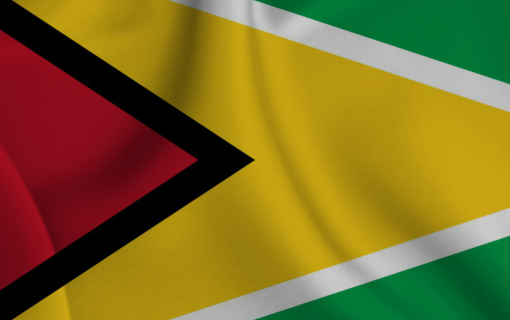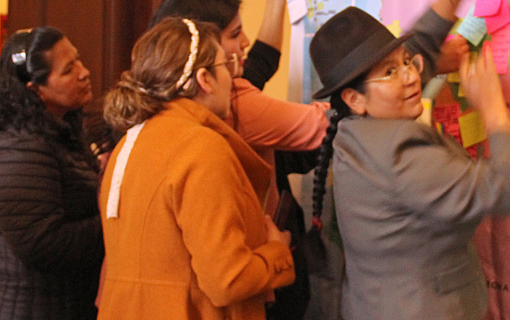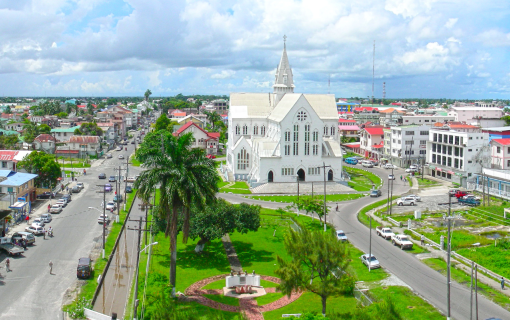Elections in Guatemala: 2023 General Elections
Guatemala will hold first-round presidential, legislative, and local elections on June 25, 2023. Polls will be open from 7 a.m. to 6 p.m. This is the country’s 10th electoral cycle since the restoration of democracy by the 1985 Constitution.
In 2023, Guatemalans will elect their next president and representatives at all levels of government. With high concerns about the economy, security, and corruption, Guatemalans can make their voices heard and channel their worries and frustrations into political change. The past months and years have seen political retaliation against judges, prosecutors, journalists, and anti-corruption activists, and the new government could enact the reforms and changes needed to set the country on another path.
Ahead of this important electoral process, the International Foundation for Electoral Systems (IFES) provides Frequently Asked Questions (FAQs) on Elections in Guatemala: 2023 General Elections.
Learn more about IFES's programs in Guatemala and follow @IFESAmericas and @IFES1987 on Twitter.
Additionally, visit IFES's Election Guide for the most comprehensive and timely verified election information available online.
Frequently Asked Questions (FAQs)
Guatemala will hold first-round presidential, legislative, and local elections on June 25, 2023. Polls will be open from 7 a.m. to 6 p.m. This is the country’s 10th electoral cycle since the restoration of democracy by the 1985 Constitution.
In 2023, Guatemalans will elect their next president and representatives at all levels of government. With high concerns about the economy, security, and corruption, Guatemalans can make their voices heard and channel their worries and frustrations into political change. The past months and years have seen political retaliation against judges, prosecutors, journalists, and anti-corruption activists, and the new government could enact the reforms and changes needed to set the country on another path.
During these elections, citizens registered to vote in Guatemala will go to the polls to elect:
- A president and vice president;
- All 160 seats of the Congress of the Republic of Guatemala;
- 340 mayors;
- 20 deputies to the Central American Parliament; and
- 3,814 members of all 340 city councils.
These elected officials will serve four-year terms, from 2024 to 2028.
The president and vice president are elected on the same ticket by an absolute majority of more than 50 percent of the votes. The outcome of the first round of voting will determine if a second round is necessary. The president of Guatemala is not permitted to serve a second term, and a former vice president may run for the presidency only after four years out of that office.
Guatemala is a presidential republic with three branches of government: executive, legislative, and judicial, as established in Article 141 of the 1985 Constitution.
The executive branch consists of the president and vice president of the Republic of Guatemala and the ministers of their respective departments. The president leads the government, state, and multi-party system.
The Congress of the Republic exercises legislative power. It is a unicameral legislature elected by closed-party list proportional representation. Of the 160 seats in Congress, 128 are elected directly in 23 multi-member electoral districts. Each electoral district represents one of Guatemala’s 22 departments (administrative divisions), with one exception. The Department of Guatemala, which includes the capital city, is divided into two districts. The remaining 32 representatives are elected from a national list through proportional representation.
To lead local governments, the president appoints the governors of the 22 departments to four-year terms. The task of governing the 340 municipalities falls under the authority of mayors and councils that the people elect directly.
Each presidential candidate must meet the following requirements:
- Complete the registration form;
- Provide a birth certificate;
- Provide a record of no claim issued by the Comptroller General of Accounts if the prospective candidate has managed public funds;
- Be at least 40 years of age;
- Be of Guatemalan origin and in full possession of their civic rights; and
- Be nominated by the political party’s national assembly.
The request for candidacy goes to the Citizen Registry of the Supreme Electoral Tribunal (TSE), which must approve or reject the candidacy in accordance with the Electoral and Political Parties Law. If the candidate is approved, then the candidacy is formalized. If the candidate is rejected, they can take the case to the judicial court. As recently as May 26, a court decision changed the list of candidates, as the Constitutional Court (Corte Constitucional) ruled to exclude front-running presidential candidate Carlos Pineda over noncompliance with candidate nomination rules. The candidacies of two other aspiring presidential candidates were denied earlier in the electoral cycle.
In the 2023 elections, 22 presidential and vice-presidential pairings were nominated by political parties’ national assemblies to run in this election and approved by the TSE:
- Party: Valor-Unionista
- Candidate: Zury Ríos
- Running Mate: Héctor Cifuentes
- Party: Unidad Nacional de la Esperanza (UNE)
- Candidate: Sandra Torres
- Running Mate: Romero Guerra
- Party: Partido Azul
- Candidate: Isaac Farchi
- Running Mate: Ulises Zaldaña
- Party: Cabal
- Candidate: Edmond Mulet
- Running Mate: Máximo Santa Cruz
- Party: TODOS
- Candidate: Ricardo Sagastume
- Running Mate: Mario González
- Party: VAMOS
- Candidate: Manuel Conde
- Running Mate: Luis Suárez
- Party: Humanista
- Candidate: Rudio Mérida
- Running Mate: Rubén Rosales
- Party: Partido Republicano
- Candidate: Rafael Espada
- Running Mate: Arturo Herrador
- Party: Partido de Integración Nacional (PIN)
- Candidate: Luis Lam
- Running Mate: Otto Marroquín
- Party: VICTORIA
- Candidate: Amílcar Rivera Estévez
- Running Mate: Hugo Mazariegos
- Party: Nosotros
- Candidate: Rudy Guzmán
- Running Mate: Diego González
- Party: Movimiento Semilla
- Candidate: Bernardo Arévalo
- Running Mate: Karin Herrera
- Party: Unión Republicana
- Candidate: Giulio Talamonti
- Running Mate: Óscar Barrientos
- Party: Comunidad Elefante
- Candidate: Hugo Peña Medina
- Running Mate: Hugo Johnson
- Party: Unidad Revolucionaria Nacional Guatemalteca (URNG-Maíz)
- Candidate: Amílcar Pop
- Running Mate: Mónica Enríquez
- Party: Frente de Convergencia Nacional (FDC-Nacional)
- Candidate: Samuel Morales
- Running Mate: Miguel Moir
- Party: Visión con Valores (Viva)
- Candidate: Armando Castillo
- Running Mate: Edgar Grisolía
- Party: Bienestar Nacional (Bien)
- Candidate: Giovanni Reyes
- Running Mate: Óscar Figueroa
- Party: Voluntad, Oportunidad y Solidaridad (VOS)
- Candidate: Manuel Villacorta
- Running Mate: Jorge García
- Party: Cambio
- Candidate: Álvaro Trujillo
- Running Mate: Miguel Ibarra
- Party: Compromiso, Renovación y Orden (CREO)
- Candidate: Francisco Arredondo
- Running Mate: Francisco Bermúdez
- Party: Mi Familia
- Candidate: Julio Rivera Clavería
- Running Mate: José Urrutia
Private Campaign Finance
In 2019, reforms to the Electoral and Political Parties Law (LEPP) established new rules for campaign finance. The law reduced the ceiling for private campaign finance from $1.00 to $0.50 per registered voter. While the total limit in 2019 was nearly GTQ 29.7 million ($3.8 million), in 2023, it is GTQ 34.9 ($4.5 million) for each of the 30 registered political parties. Under the reformed LEPP, political parties must have accounts in each department and municipality where they are present. To verify political parties’ financial management practices, the Supreme Electoral Tribunal can request financial information from the Comptroller General of Accounts, Fiscal Administration Superintendency, and Bank Superintendency.
Public Campaign Finance
According to the LEPP, the state will contribute financing to each political party at the equivalent of $2.00 for every vote cast for the offices of president and vice president or for deputies in the National List. To obtain this right, the party must have received no less than 5 percent of valid votes cast for the seats mentioned above or have at least one seat in them.
The Supreme Electoral Tribunal (TSE) is the election management body of Guatemala. In 1982, the Organic Law of the Supreme Electoral Tribunal, passed under Executive Decree 30-83, established the TSE. The decree declares that the TSE is an autonomous body independent of any other government authority.
The TSE is directly responsible for regulating all activities related to exercising citizens’ electoral rights—political parties, the use of political rights and organization, and serving as electoral authorities—to promote free and transparent elections in Guatemala. The TSE is also responsible for election dispute resolution. Additionally, as of 1983, the TSE is the entity charged with convening the National Constituent Assembly. The National Assembly wrote and now enforces the Political Constitution of the Republic which, along with the Electoral and Political Parties Law (LEPP), governs the TSE. The 2016 reforms to LEPP expanded the TSE’s oversight powers, including over political and campaign finance and campaigns’ use of the media. Since the revisions to the LEPP were passed, the TSE has established new, specialized units to comply with these powers—the Media and Public Opinion Studies Specialized Unit and the Political Party Finance Control and Oversight Specialized Unit.
Five incumbent magistrates and five alternate magistrates make up the TSE. The Postulation Commission nominates magistrates; a two-thirds majority of the Congress of the Republic deputies must approve candidates. The magistrates serve a term of six years; the current term runs from 2020 to 2026.
Guatemala uses national and international tools to promote women's rights and participation.
Domestically, the Supreme Electoral Tribunal (TSE) is governed by several laws that stress its commitment to eradicating gender-based violence and aim to promote the participation of women. These include:
- Law for the Prevention, Sanction, and Eradication of Interfamily Violence, Decree Num. 97-96;
- Law for the Integral Promotion Dignity of Women, Decree Num. 7- 99;
- Law for Social Development, Decree Num. 42-2001;
- Law for Urban and Rural Development Councils, Decree Num. 11-2002;
- Municipal Code, Decree Num. 12-2002;
- General Decentralization Law, Decree Num. 14-2002;
- National Languages Law, Decree Num. 19-2003;
- Law on Educational Promotion Against Discrimination, Decree Num. 81-2002;
- Law on Universal, Equitable and Quality Access to Family Planning Services and its Integration into the National Program on Reproductive Rights, Decree Num. 87-2005; and
- Law Against Femicide and Other Forms of Violence Against Women, Decree Num. 22-2008.
The TSE includes in its Institutional Strategic Plan (2021–26) policies that promote women’s participation in the political and electoral spheres, such as its Gender Equality Policy, which establishes actions that facilitate the increased representation and participation of indigenous women, including “Mayan, garífuna, xinka, and mestiza women” in the electoral process.
Guatemala signed and ratified the Convention on the Elimination of All Forms of Violence Against Women through Decree Num. 49-82. It also incorporated actions to meet the requirements of the Global Action Platform (Beijing, 1995) through implementing its third policy by the Department of Political Promotion for Women and other national plans (i.e., its annual operational plans).
While violence may occur at any point during the electoral cycle, it is commonly related to disagreements among voters about voting results and is especially prevalent at the local level. The domestic election observation group Mirador Electoral reported 14 violent deaths and armed attacks in the 2019 electoral cycle. Also notable in 2019, the entire town voting board in San Jorge, Zacapa, resigned after receiving death threats, hours before the June 16 elections. As a result, the Supreme Electoral Tribunal (TSE) was forced to suspend voting until a reinforced police presence enabled residents to vote during the second round of elections in August 2019. This recent history of electoral conflict highlights the importance of preparations for conflict prevention and mitigation.
During the 2023 electoral cycle, the TSE has conducted regular risk assessments to map the risks of electoral conflict and identify municipalities at high, medium, and low risk. As the highest election authority, the TSE coordinates electoral security with relevant stakeholders. To that end, and based on its risk assessment and mapping, the TSE established electoral security working groups with the Ministry of Interior, Public Ministry, Ministry of Defense, National Police, emergency responders, and others to mitigate and address electoral security issues that may occur on Election Day and afterward. A crisis management center will be established at TSE election headquarters and staffed by representatives of the electoral security working group. The center will collect data at the local level that will enable a coordinated response to any violence that may arise during and after the elections.
For these elections, the TSE developed the Agreement for an Ethical, Peaceful, Organized, and Democratic Campaign, comprising 16 commitments by political parties to promote an electoral process free of conflict and violence. The commitments emphasize peace and tolerance for and among all candidates and citizens; 27 of the 30 registered parties signed the document. The TSE developed similar department-level ethical pacts to promote peaceful and ethical local elections.
Registered Guatemalans over the age of 18 are eligible to vote. For the June 25 elections, there are 9,361,068 registered voters (5,067,859 women and 4,293,209 men). Since the 2019 elections, the number of registered voters increased by 1,307,085 from the 8,053,983 (4,324,331 women and 3,729,052 men) who voted in that year. Registered voters between the ages of 18 and 25 make up 8.7 percent of the electorate (811,128 voters). The Supreme Electoral Tribunal has a website to facilitate registration. The deadline for voter registration in these elections was March 25.
In Guatemala, the police and active-duty members of the armed forces cannot vote and must remain in their facilities on Election Day.
The Supreme Electoral Tribunal (TSE) takes specific actions to ensure that persons with disabilities have the same opportunities to exercise suffrage as the rest of the population. According to Guatemala’s electoral laws, citizens with disabilities have the right to vote with the assistance of a person of their choice. To ensure equity, the TSE:
- Makes five sets of braille ballots available at each polling booth for voters with visual impairments;
- Provides voting booths that are physically accessible for voters who use wheelchairs;
- Provides electoral workers an orientation on how to administer the vote to persons with disabilities and respect their rights; and
- Ensures that all voting centers are located at ground level.
In April 2023, 27 of Guatemala’s 30 political parties registered in the elections signed the Agreement for an Ethical, Peaceful, Organized and Democratic Campaign. That agreement included the parties’ commitment to promote more inclusive elections. One commitment in the document states that electoral campaigns must avoid harassment and violence, including in messages and images, toward women, Indigenous populations, persons with disabilities, LGBTIQ communities, and others. Another commitment establishes that social media and other communications technology will not be used to spread disinformation or propagate hate speech against women, persons with disabilities, Indigenous populations, or LGBTIQ communities.
In 2019, Guatemalans residing abroad could vote for president and vice president for the first time. Article 1 of Decree 26-2016, which reformed the Electoral and Political Parties Law, establishes that:
“The Supreme Electoral Tribunal (TSE) with support from the state institutions to which this request was made will conduct the necessary actions to ensure the right. Out-of-country voting will take place on the same date as Election Day in Guatemala and in all cases the TSE will be charged with the enforcement of all rules relative to the implementation of the voting process for all Guatemalan citizens residing out of the country.”
In 2019, the TSE organized in-person voting at four voting centers for 63,267 registered Guatemalans who reside in the United States. However, only 734 Guatemalans voted from the United States.
This year, 90,708 Guatemalans living in the United States are registered to vote. During this electoral cycle, the TSE has increased its efforts to spread awareness of how and where to vote in the United States in hopes of significantly increasing the turnout of Guatemalans abroad. The TSE also set up voting centers in 15 U.S. cities to serve voters on June 25.
Guatemala will have both national and international electoral observers. The Supreme Electoral Tribunal (TSE) has an online portal for observers to apply. According to its guidelines, national observers must be Guatemalan citizens, have photo identification cards, and cannot be affiliated with a political party. International observers must receive an invitation from the TSE and be interested in electoral observation. The TSE expects approximately 22,000 national and international observers on June 25.
The results of the first round of elections determine whether a second round will take place for the office of the president and vice president. A second round is necessary if no candidate ticket receives over 50 percent of the vote. If required, it will occur on August 20 as a run-off between the two candidates receiving the most votes. No presidential candidate has won an absolute majority of votes in the first round of elections since Guatemala’s return to democracy in 1985.
Based on the 2016 reforms, a second round may be required for some contests if more than half of all votes counted are null. If the nullified election is for the offices of the president and vice president, then the repeat election will be scheduled for a Sunday in October. If required, a second round must occur 45 to 60 days after the first election.
If the null votes are not for the presidential contest, the election’s repetition will occur on the same date as the second presidential round.
The official vote count begins at 6 p.m. on Election Day. Votes are counted manually at each of the 24,585 vote reception boards. Each board has five members, including a president. Poll watchers from political parties and national and international observers oversee the vote-counting process. As part of the process, the political party poll watchers witness, verify, and sign the tally sheets submitted to the voting center for official transmission to the Supreme Electoral Tribunal (TSE) National Preliminary Results Center. Tally sheets are transmitted to the tabulation center via scan technology. The TSE’s transmission of preliminary results entity expects to announce the first results beginning at 9 p.m. on Election Day.
The Supreme Electoral Tribunal is expected to announce preliminary results beginning at 9 p.m. on Election Day or shortly thereafter. According to Article 245 of the Electoral and Political Parties Law, the final official results must be announced within eight days after the elections.
In 2017, the International Foundation for Electoral Systems (IFES) and the Consortium for Elections and Political Process Strengthening (CEPPS) began work on the Electoral Governance and Reforms Project, funded by the United States Agency for International Development. This ongoing program aims to improve governance within Guatemala’s key electoral institutions and increase civic participation. Building on its long-term partnership with the Supreme Electoral Tribunal, IFES committed its support to implementing the most recent reforms to the Electoral and Political Parties Law (Ley Electoral y de Partidos Políticos), approved in 2016 and enacted in 2019.
These FAQs reflect decisions made by the TSE as of June 23, 2023, to the best of our knowledge. This document does not represent any International Foundation for Electoral Systems policy or technical recommendations.
This paper is made possible by the generous support of the American people through the United States Agency for International Development (USAID). The information herein is provided by the author(s) and does not necessarily reflect the views of USAID or the United States Government.




